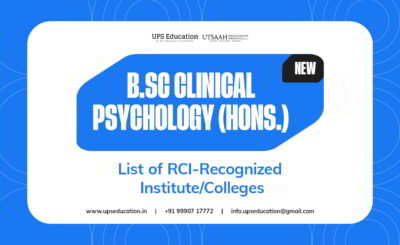Clinical Psychology is a subsidiary of Psychology that concentrates on the diagnosis, treatments, and prevention of mental and emotional disorders or psychological distress. Clinical Psychologists are coached professionals who work with families and individuals to assist them in comprehending and managing a large range of psychological and emotional problems.
This is one of the most preferable designations in the area of Psychology. It is the dream of many students to become a Clinical Psychologist. Clinical Psychologist is the most preferable program by the students as compared to other Psychology programs.
Do you want to be a Clinical psychologist and work as a professional Clinical Psychologist in India? Well, we receive a lot of queries on a daily basis about how can we work as Clinical Psychologist, and what are the career options after Master’s in Psychology and After M.Phil. Clinical Psychology programs. In this article, we have mentioned what is the procedure to be a Clinical Psychologist in India.
There are various options that we can choose to study for our career. After completing Master’s in Psychology, you have three options to be a Clinical psychologist which are as follows:
- M.Phil. Clinical Psychology
- Doctor of Psychology (Psy.D.)
- Professional Diploma in Clinical Psychology (PDCP)
M.Phil. Clinical Psychology
Master of Philosophy or M.Phil. Clinical Psychology is a two-year program that is pursued by most of the candidates after the completion of Master’s in Psychology to be a Clinical Psychologist. This course basically has 4 semesters. To be eligible for this program, students must have completed their Master’s in Psychology /Clinical Psychology /Applied Psychology or any other similar specialization with not less than 55% marks in aggregate. The number of RCI-recognized institutes for M.Phil. Clinical Psychology in India is approximately 65.
The admission criteria might be different in various universities for admission to M.Phil. Clinical Psychology.
M.Phil. Clinical Psychology is available in regular mode only and regulated by the Rehabilitation Council of India (RCI). Clinical Psychology is an integral piece of human science and behavioral science for the purpose of understanding and developing well-being and personal development. After successfully completing this course, the student can get a license from RCI to work as a Clinical Psychologist.
Click here to learn more about M.Phil. Clinical Psychology
Doctor of Psychology (Psy.D.)
A Doctor of Psychology (Psy.D.) is a professional doctoral degree that concentrates on the practical implementation of Psychology, specifically in Clinical Psychology.
Students who are doing preparation for the entrance for either M. Phil or Ph.D. in Clinical Psychology also apply for this. The students apply for this course to complete their Doctorate and receive the RCI License as well as to practice as Clinical Psychologists in India.
Psy.D. is an alternative course for the M.Phil. program in Clinical Psychology, which is a 4-year course after Master’s degree and a 2-year course (later entry) after M.Phil. Clinical Psychology with at least 60% marks.
Most of the Psy.D. programs demand candidates to complete a superintended internship or practicum. These practical experience and knowledge are essential to become a licensed psychologist. Psy.D. course often gives access to students to become special in areas like Clinical Psychology, Counselling Psychology, Neuropsychology, and other fields of applied Psychology.
As per the new pathway, students will be able to pursue graduation for 4 years. After completing graduation, they will have to pursue M.A. in Clinical Psychology to be a Clinical Psychologist.
Professional Diploma in Clinical Psychology
The PDCP is a 1-year professional training program that aims to train students with an acceptable level of competency to present basic mental health assistance like identifying and diagnosing mental health issues in various populations. A candidate gets an RCI license of a Clinical Psychologist (Associate) after successfully completing this diploma course.
To pursue this course, students have to complete their Master’s in Psychology with not less than 55% or 50% marks. The admission criteria might be different in some institutes for Professional Diploma in Clinical Psychology (PDCP).
The designation of a Clinical Psychologist (Associate) is a bit different as compared to a Clinical Psychologist. The responsibility of a Clinical Psychologist (Associate) is to assist individuals with mental health issues by providing them therapies and support. A Clinical Psychologist does not have the authority to teach independently, guide, or supervise students in the department of Clinical Psychology.
UPS Education
UPS Education specializes in providing classes for M.Phil. in Clinical Psychology/ UGC NET JRF and Master’s in Psychology Entrance Exam. We have appropriate experience in helping candidates with these Exams. students at UPS Education have consistently performed well in various psychology entrance exams.
UPS Education motivates students to attain their highest potential while achieving their goals. UPS Education provides classes in three different modes. Candidates have the option to attend the classes in person which is available in regular mode, live interactive mode, and virtual recorded sessions. Every year, the students get qualified in various institutions such as NIMHANS, CIP Ranchi, RINPAS, PGIBAMS, etc.






